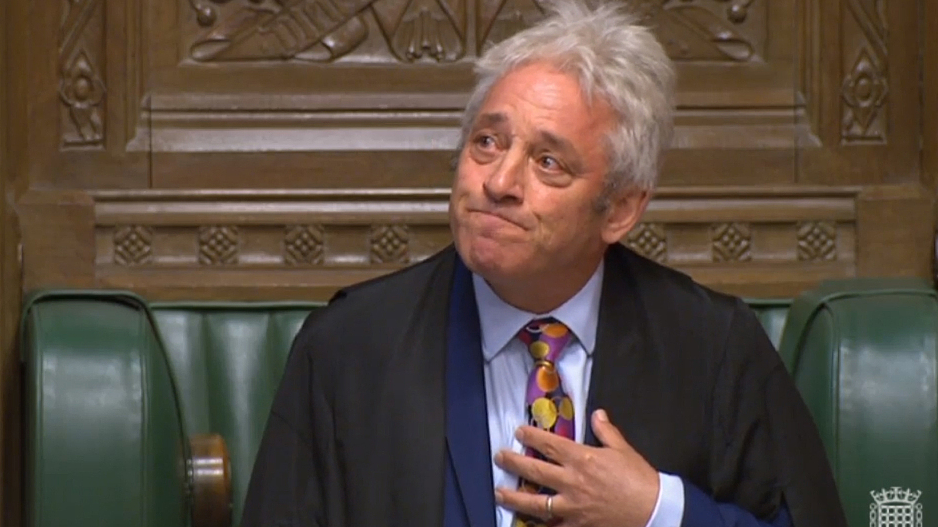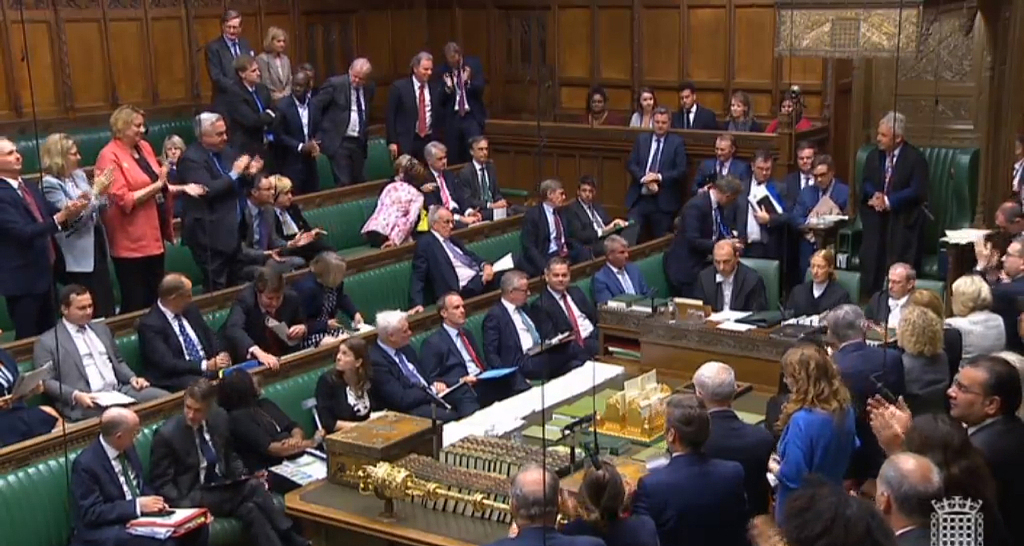

Editor's note: Mike Cormack is a writer, editor and reviewer mostly focusing on China, where he lived from 2007-2014. He edited Agenda Beijing and is a regular book reviewer for South China Morning Post.The article reflects the author's opinions, and not necessarily the views of CGTN.
The Speaker in the British parliament is expected to be something of an umpire, chairing debates and ensuring procedures are followed, unlike for example the Speaker in the U.S. House of Representatives, who is a party and political leader. The Speaker in the parliament may have exceedingly important duties, but these are often found during attempts at transgression, rather in normal times. These, plainly, are not normal times for British politics or for British democracy, and so Speaker John Bercow has wielded an unusually high level of influence on parliament.
Bercow's journey has been an unusual one. He was chairman of the Federation of Conservatives Students (FCS), a group known for its intense partisanship -– for instance producing a poster saying "Hang Nelson Mandela" and accusing former British prime minister Harold Macmillan of treason.
The then party chairman Norman Tebbit – no shrinking violet himself – eventually disbanded the FCS altogether. During this time he was also a member of the Monday Club, a fervently right-wing fringe group which called amongst other things for the "assisted repatriation" of immigrants. (Bercow has since called his membership "utter madness"). He was then elected as a Conservative Member of Parliament (MP) in 1997, after having been a councilor and special advisor to cabinet ministers Jonathan Aiken and Virginia Bottomley.
But in 2002 Bercow came out, as it were, as a social liberal, during a speech in which he backed the Adoption and Children Act (allowing gays and lesbians to adopt children) and explained why he had changed his mind on the matter. Given that this was during the high period of Tony Blair's premiership, suspicion fell on Bercow that he might be something of a turncoat, someone trimming their views to fit with the prevailing political weather.
His election as Speaker came in 2009, after the previous Speaker, Michael Martin, lost the confidence of the House during the expenses scandal of 2008. Despite the convention that Labour and Conservatives took turns with the Speakership, Martin was the second Labour MP in succession to be elected. This is no doubt part of the decline of the unwritten rules underpinning Westminster during the last 20 or so years. Labour MPs could hardly vote en masse for another member from their party for the third time in a row, and so went for Bercow, perhaps as the Tory MP judged to be most friendly to their views. Notably, unlike other contenders in a strong field, Bercow had no ministerial or select committee chairmanship experience, though he campaigned on "strengthening backbench involvement and opportunity in parliament".
Bercow's tenure as Speaker has largely come under governments from his own party. Yet the hostility between him and ministers has been remarkable. The reasons for this are not hard to find. Bercow has been an activist Speaker, keen to reverse the power of the executive over the House of Commons. He allowed the constitutional convention of Prime Minister's Questions to run on because of the number of interruptions, expanding the session from the designated 30 minutes to around 45.
He has been prompt to scold MPs for rowdy behavior, to the point of sounding "nannyingly" patronizing. His running battle with Andrea Leadsom, expressed in mutual contempt, has been entertaining if unedifying. But it is during Brexit that Bercow's stance and handling of parliament have been at their most interventionist. He has not been scared to stand up against government ministers attempting to bend the rules to push through Brexit

Speaker John Bercow announces that he will stand down during an impassioned speech in the House of Commons, London, UK, Sept 9, 2019. /VCG Photo
So why is Bercow resigning now?
He has pledged to resign by the Brexit deadline of October 31. Bercow had previously survived an attempt to unseat him at the end of the 2015 parliament. Last minute impromptu support from backbench and opposition MPs – who called the manoeuvre "a grubby, squalid and nauseous" plot – kept him in the post. However, following reports (which he has consistently denied) that he oversaw a bullying culture in the Speaker's Office saw him pledge to step down by 2022. But resigning before a general election will allow the current parliament, after its prorogation, to vote for a successor. With the Conservatives lacking a majority, this is the best time to stop them from getting their preferred choice.
What legacy will Bercow leave? Given his prominence during the Brexit crisis, his phrases (famously: "OHHH DEEHHRR!") have certainly entered the public consciousness – though this is really a minor matter. More importantly, Bercow has been an active rather passive Speaker, willing to forgo tradition and precedent when he felt that matters required it.
For example, he stopped Theresa May from serially putting her Brexit deal to the Commons, after it had already been defeated three times. And most recently, he allowed MPs to use an emergency Standing Order debate to prevent the government forcing through a no-deal Brexit. These moves clearly discomfited ministers accustomed to having their way in parliament.
His resignation speech likewise was easy to disparage as overly self-admiring and partisan. His praise of the Commons was an obvious message to a government planning to prorogue it. But extraordinary times call for extraordinary measures. Despite the assurances of ministers, the suspension of parliament is clearly for the convenience of a government desperate to avoid scrutiny during the worst political crisis in 100 years. Speakers may come and go during normal times when convention and procedure are rarely contested. It is during crises that people are truly measured. Bercow was a Speaker who did not flinch from upholding the rights of parliament at a time when British governments seem ill-inclined to respect its powers or views.
He will be remembered.
(If you want to contribute and have specific expertise, please contact us at opinions@cgtn.com.)

Copyright © 2018 CGTN. Beijing ICP prepared NO.16065310-3
Copyright © 2018 CGTN. Beijing ICP prepared NO.16065310-3